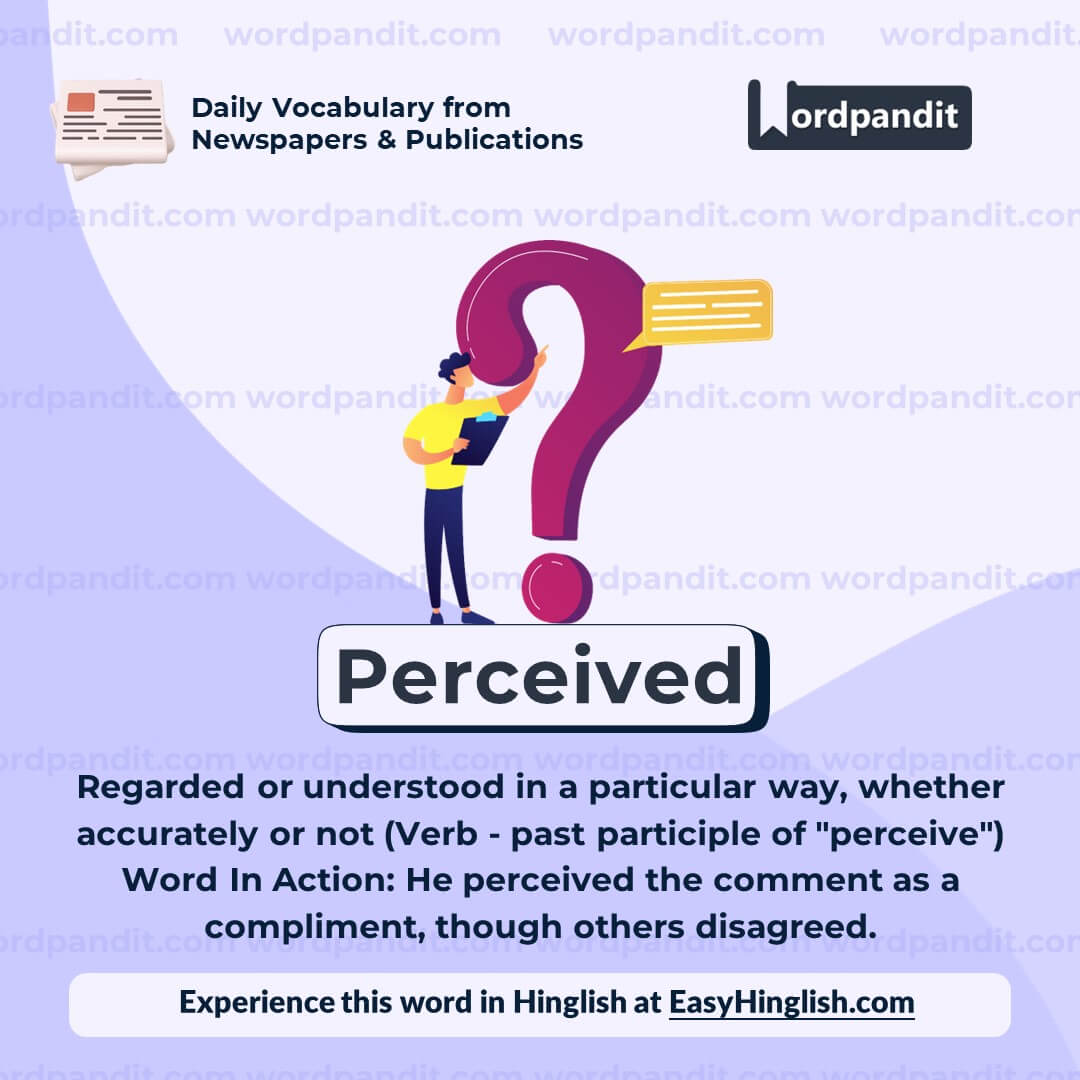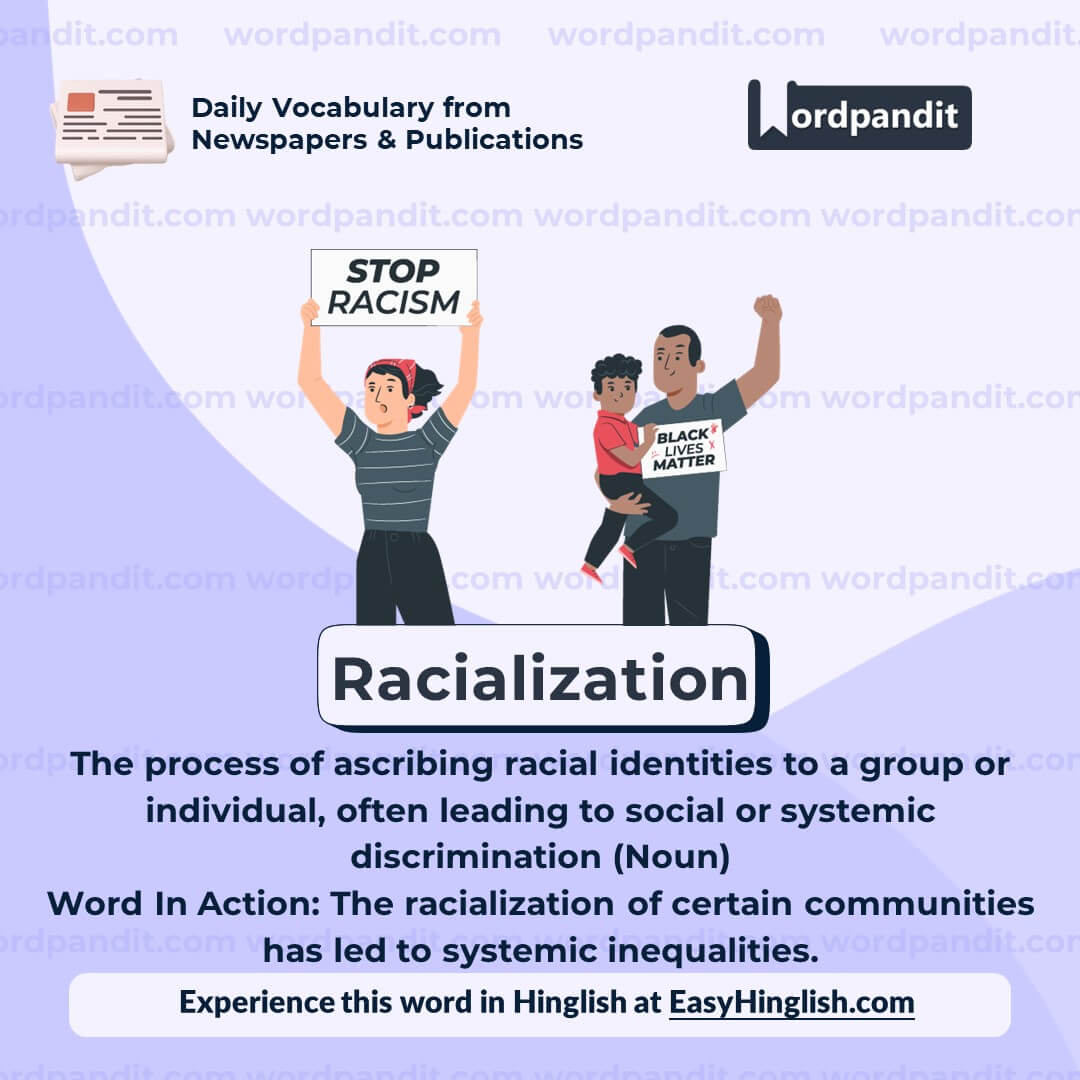Daily Vocabulary from Indian Newspapers and Publications
Welcome to Wordpandit’s Indian Vocabulary Hub
At Wordpandit, we understand the importance of staying rooted in the local context while expanding your language skills. This section focuses on enriching your vocabulary with words and phrases drawn from India’s leading newspapers and publications, ensuring you're learning vocabulary that is practical, relevant, and uniquely Indian.
Why Indian Sources Matter
We believe that the best way to master any language is by immersing yourself in local content. That’s why we carefully curate vocabulary from top Indian publications, including:
- The Hindu
- The Times of India
- The Economic Times
- Hindustan Times
- Live Mint
- The Indian Express
- And many others...
Stay Updated, Stay Relevant
With daily updates from Indian news sources, you’ll be consistently learning words that reflect the trends and shifts in Indian society and culture. Our focus is to provide vocabulary that enhances your understanding of the language in an Indian context.
How Wordpandit Supports Your Goals
Whether you’re preparing for exams, aiming to improve your professional communication, or simply want to stay connected with the latest Indian vocabulary, Wordpandit is here to guide you every step of the way.
Learn with a Practical Approach
Our interactive learning methodology includes real-world examples, engaging activities, and context-specific usage to ensure that every word becomes part of your active vocabulary.
Dive into Indian Vocabulary Today!
Why Choose Wordpandit?
Practical Learning: Focus on words you'll actually encounter in real-world reading, enhancing your comprehension and communication skills.
Diverse Content: From current affairs to scientific breakthroughs, our varied sources expose you to vocabulary across multiple domains.
Effortless Integration: Make Wordpandit a part of your daily routine. Just a few minutes each day can significantly boost your lexicon over time.
Your Path to Vocabulary Mastery
- Visit our Daily Vocabulary section regularly
- Explore new words and their usage in context
- Practice incorporating these words into your own writing and speech
- Track your progress as your vocabulary expands
Start Your Journey Today
Embark on your vocabulary enhancement journey with Wordpandit. By consistently engaging with our daily posts, you'll build a robust vocabulary that serves you well in academic, professional, and personal contexts.
Remember, a word a day keeps linguistic limitations at bay. Make Wordpandit your daily companion in the quest for vocabulary excellence!
WORD-1: Perceived
Context:
"The foremost purpose of Islamophobia is this: to remove Arabs and Muslims perceived to be a threat to empire building." - The Wire
Explanatory Paragraph:
The word "perceived" refers to something that is understood, interpreted, or regarded in a certain way, often based on opinion or assumption rather than fact. It highlights the way something is seen or believed to be, which may or may not reflect reality.
Meaning: Regarded or understood in a particular way, whether accurately or not (Verb - past participle of "perceive").
Pronunciation: per-SEEV'D
Difficulty Level: ⭐⭐ (Beginner-Intermediate)
Etymology: Derived from the Latin "percipere," meaning "to seize, understand, or take in."
Synonyms & Antonyms:
Synonyms: regarded, considered, interpreted, believed, assumed
Antonyms: ignored, overlooked, disregarded, unnoticed
Usage Examples:
- Despite his calm demeanor, he was perceived as a threat by the security guards.
- The new policy was perceived as unfair by many employees.
- She perceived a slight hesitation in his voice, which made her suspicious.
- The artist's work is often perceived differently depending on the viewer’s perspective.
Cultural Reference:
"There is nothing either good or bad, but thinking makes it so." - William Shakespeare, *Hamlet*. This quote highlights how perception shapes our understanding of reality.
Think About It:
Can perception ever be completely objective, or is it always influenced by personal biases?
Quick Activity:
Write a short paragraph describing an event from two different perspectives. How does perception change the way the event is understood?
Memory Tip:
Think of "perceived" as "see + believed"—what you believe based on what you see, whether true or not.
Real-World Application:
"Perceived" is often used in social issues, psychology, and politics to discuss how people’s interpretations of reality can shape their actions and beliefs. Understanding perception helps in communication, conflict resolution, and critical thinking.
WORD-2: Tolerant
Context:
"While presenting himself as tolerant of diversity, he was educating me on how to speak of my own experiences." - The Wire
Explanatory Paragraph:
"Tolerant" describes someone who is open-minded, accepting, and willing to respect different opinions, beliefs, or behaviors, even if they do not personally agree with them. It reflects an attitude of patience and understanding in the face of differences.
Meaning: Showing acceptance or openness toward different views, behaviors, or people (Adjective).
Pronunciation: TOL-uh-runt
Difficulty Level: ⭐⭐ (Beginner-Intermediate)
Etymology: Derived from the Latin "tolerare," meaning "to endure, bear, or sustain."
Synonyms & Antonyms:
Synonyms: accepting, open-minded, patient, understanding, broad-minded
Antonyms: intolerant, narrow-minded, prejudiced, bigoted
Usage Examples:
- She was known for being tolerant of different cultural perspectives.
- A truly tolerant society allows free speech and diversity of thought.
- Despite their differing beliefs, he remained tolerant of his friend’s opinions.
- The teacher encouraged the students to be tolerant of each other’s viewpoints.
Cultural Reference:
"Laws alone cannot secure freedom of expression; in order that every man present his views without penalty, there must be a spirit of tolerance in the entire population." - Albert Einstein
Think About It:
Is there a limit to tolerance? Should we tolerate views that promote intolerance?
Quick Activity:
Write a short paragraph about a situation where you had to be tolerant of someone else’s perspective. How did it feel?
Memory Tip:
Think of "tolerant" as "toll + rent"—just like paying a toll allows cars to pass, being tolerant allows different views to pass without blocking them.
Real-World Application:
"Tolerant" is a key concept in discussions about social harmony, democracy, and human rights. It is essential in workplaces, education, and politics, where diverse perspectives need to coexist peacefully.
WORD-3: Racialization
Context:
"Like other forms of racialization, anti-Muslim racism, by assigning fixed identities, shrinks narrative options." - The Wire
Explanatory Paragraph:
"Racialization" refers to the process by which social, economic, or political meanings are attached to race, often leading to stereotyping and discrimination. It occurs when a group of people is categorized based on racial characteristics, whether real or perceived, influencing how they are treated in society.
Meaning: The process of ascribing racial identities to a group or individual, often leading to social or systemic discrimination (Noun).
Pronunciation: RAY-shuh-luh-ZAY-shun
Difficulty Level: ⭐⭐⭐ (Advanced)
Etymology: Derived from "racial" (from Latin *radix*, meaning "root") and the suffix "-ization," which signifies a process.
Synonyms & Antonyms:
Synonyms: racial profiling, stereotyping, social categorization, ethnic labeling
Antonyms: individualization, de-stereotyping, neutral classification
Usage Examples:
- The racialization of immigrants often leads to unfair policies and prejudices.
- Many scholars study how media representation contributes to the racialization of certain communities.
- His experiences showed how racialization can shape one’s opportunities in life.
- Discussions on racialization are essential for promoting inclusivity and dismantling biases.
Cultural Reference:
"We must reject not only the stereotypes others have of us but also those that we have of ourselves." - Shirley Chisholm, the first Black woman elected to the U.S. Congress, highlighting the dangers of racialization.
Think About It:
How does racialization affect the way people perceive themselves and others in society?
Quick Activity:
Think of a historical event where racialization played a significant role. Write a short paragraph explaining its impact.
Memory Tip:
Remember "racialization" as "race + realization"—it’s about realizing how race is socially constructed and affects people’s lives.
Real-World Application:
"Racialization" is widely discussed in sociology, politics, and media studies. It helps explain systemic inequalities and promotes awareness of how race is used as a tool for social categorization and discrimination.
WORD-4: Covert
Context:
"My grief about the war, as well as about anti-Muslim racism as both culturally encouraged and denied, were also to be kept covert." - The Wire
Explanatory Paragraph:
The word "covert" refers to something that is hidden, secret, or not openly acknowledged. It is often used to describe actions, operations, or emotions that are deliberately kept out of public view. Whether it’s a covert military mission or covert feelings, the word implies intentional secrecy.
Meaning: Hidden, secret, or not openly displayed (Adjective).
Pronunciation: KOH-vert / KUH-vert
Difficulty Level: ⭐⭐ (Intermediate)
Etymology: Derived from the Old French *covrir*, meaning "to cover," and the Latin *cooperire*, meaning "to conceal or hide."
Synonyms & Antonyms:
Synonyms: hidden, secret, undercover, clandestine, stealthy
Antonyms: overt, open, public, obvious, transparent
Usage Examples:
- The organization carried out a covert operation to rescue hostages.
- Her covert glance at the test paper did not go unnoticed by the teacher.
- They exchanged covert messages to avoid suspicion.
- Some governments engage in covert surveillance of their citizens.
Cultural Reference:
During the Cold War, both the United States and the Soviet Union engaged in covert espionage operations, using spies and secret missions to gather intelligence.
Think About It:
Is secrecy always a bad thing, or are there situations where being covert is necessary?
Quick Activity:
Think of a book or movie that involves a covert mission or secret plan. Write a sentence summarizing how secrecy played a role in the story.
Memory Tip:
Think of "covert" as "covered"—something that is hidden or not easily seen.
Real-World Application:
"Covert" is widely used in intelligence, military strategy, psychology, and even business, where companies may engage in covert market research or competitive analysis.
WORD-5: Omnidirectional
Context:
"The narrative tropes that oil the machine of empire are so normalised, unquestioned, and omnidirectional that they become, to quote Ugandan writer Mahmood Mamdani, 'culture talk.'" - The Wire
Explanatory Paragraph:
The word "omnidirectional" describes something that moves or extends in all directions at once. It is often used to refer to signals, perspectives, or influences that are not limited to a single path but spread out equally in all directions.
Meaning: Extending or operating in all directions (Adjective).
Pronunciation: om-nee-duh-REK-shuh-nuhl
Difficulty Level: ⭐⭐⭐ (Advanced)
Etymology: Derived from Latin *omni-* meaning "all" and *directional* meaning "relating to direction."
Synonyms & Antonyms:
Synonyms: all-encompassing, all-around, 360-degree, radial
Antonyms: unidirectional, linear, focused
Usage Examples:
- The omnidirectional antenna can pick up signals from any direction.
- Modern leadership requires an omnidirectional approach, considering multiple perspectives at once.
- Her omnidirectional influence in the community ensured that her ideas reached all social groups.
- The omnidirectional movement of the robotic vacuum allows it to navigate efficiently.
Cultural Reference:
Omnidirectional microphones are widely used in the music and broadcasting industries, as they capture sound from all directions equally.
Think About It:
Can an omnidirectional approach in decision-making be more beneficial than a focused, unidirectional one?
Quick Activity:
Think of a field (e.g., communication, leadership, warfare) where omnidirectional strategies are useful. Write a short explanation of how they help.
Memory Tip:
Break it down: *Omni* (all) + *directional* (relating to direction) = moving or affecting in all directions.
Real-World Application:
"Omnidirectional" is commonly used in engineering (e.g., antennas, cameras), leadership (e.g., decision-making strategies), and social sciences (e.g., the spread of ideas and influence).



















